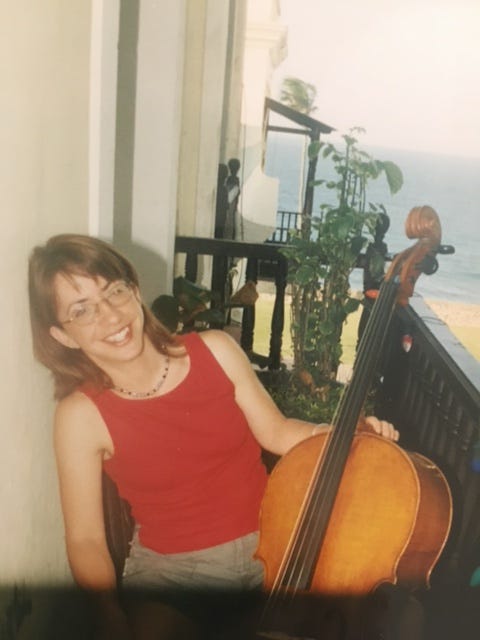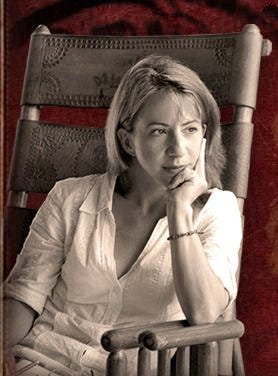Part II of Four Things I Didn't Need to Become a Successful Novelist and Five Things I Did
About reading logs, investment in self and taking risks, agents, writing community, and resilience
Some days1 ago I posted about how I didn’t need to live in a big city, have an impressive social media following, rely on job security in the form of a “serious” non-writing career, or get an MFA (even though I did enjoy getting one) in order to become a successful novelist. Here’s that Part I.
Well, what about the second part, about what I DID need? Here it is!
READING LOG
In the MFA program I attended over a decade ago, we had to write short annotations about our reading, both assigned and unassigned. Luckily, I had started that process eight years earlier2, so I already knew how helpful it would be—and here I present it as the most important (and cheapest!) thing you can do to fill your sails as a writer. No MFA needed!
Writing in the margins of your books is useful. A reading log, with or without annotations, is even better. Here, in a format for your eyes only—no need to impress anyone on Goodreads—you can focus both on what you liked or disliked and on what you’re learning. For years, I made selective notes about POV, characterization, or description, for example—whatever interested me at the time. I extracted whatever I needed as it related to my manuscripts in progress. I can’t count the number of times I’ve looked back to see what I thought about certain titles.
Predictably, I did get lazier with age. Instead of 2-5 pages per book, I defaulted to writing mere paragraphs. For a while, I skipped the log altogether, but then I remembered how helpful it was, and I rededicated myself. At the very least I list books I’ve read, give them a rating from 1-10, and underline the ones that feel important to continue thinking about or even re-read.
If this isn’t already one of your habits, start now, and start small if you must, but give it a try. If the task becomes burdensome, simplify.
INVESTING IN YOURSELF AND TAKING RISKS
Becoming a writer, especially if you intend to write and publish books, is very much like starting a business. You must invest time. You must invest money. You may not see the “ROI” (return on investment) for a long time but don’t let that stop you from putting your money where it matters.
Among the things worth investing in:
· Subscriptions and memberships
· Books and other sources of reading
· Conferences, for meeting both writers and agents
· Coaching or developmental editing
· Time away, alone, to research or write

Yes, you can write at home or in a café. But it is also very useful to allow yourself, at regular intervals, to go away to a residency or retreat, even if it is self-funded. In fact, DIY solo retreats to a hotel or Airbnb are my ideal way to finish or revise a novel (or sometimes, to visit archives). For research, I’ll go on long trips, but when I’m writing or revising, four to five nights is often enough. During that time, I will sometimes write as much as I write at home in a month. Even with many books under my belt, I still ask myself if I can really “afford” to take time away. The answer: Yes. I can and I must. I’m worth it. You are, too.
The “risk” part in this subhead is included because you may feel that spending is risky. Or that doing something else—like sending a query or pitching an agent—is risky, if you’re not feeling ready. My advice: risk as much as you can tolerate. Don’t wait.

GETTING AN AGENT
I haven’t used an agent to sell all my books, and yes, you can submit to some publishers without them. Depending on your project and audience, that may make sense. But for most us, having an agent is important. Without one, you won’t be able to submit to the bigger publishers or hope for a bigger advance. But that’s not all.
Mid-career, after leaving my second agent, I decided that being agentless was the better option, given that I was selling all of my novels to the same publisher, with whom I had an excellent relationship. After going agentless for two books, I now realize the error of my thinking. Having an agent—even when you’re not having trouble pitching your books to a familiar editor—is still important. My third agent has helped me with ongoing advance negotiation, holding onto sub-rights more assertively, and following up on sub-rights issues (film/TV, for example) more conscientiously. She has provided developmental editing advice as well. She does much more than simply finalize contracts, in other words.
If you want to get an agent, it’s important to recognize that it can be a tough, long journey. Subscribe to Publishers Marketplace, where you can research agents and deals. Meet agents in person when you can, at conferences for example; even online, you can sometimes pay for opportunities to pitch your project and get a clearer sense of how the pitch could be improved. Many queries end up in a void, so use referrals (introductions) when you can. If you don’t want to wait for an agent and would prefer to submit on your own (especially to a regional or academic publisher, say), that may be a good option. Just be honest with yourself about the pros and cons. Act strategically, not from a place of insecurity or fear.
COMMUNITY OF WRITERS
Find or make your community of writers. When I lived in Alaska, that meant co-founding a literary nonprofit, 49 Writers, to fill a void. (Oh, look, I’m teaching an online class about characterization for them March 16 & 23! :)
Whether you join a writing group (or several), take classes at a writing center, attend local conferences, or meet like-minded writers some other way, these connections will help you thrive.
When I left Alaska, I felt like I was back at square one. I spent several years whining and making excuses. I kept reaching out to the same few people, including friends who were no longer writing, as if I could turn them into the people I could talk writing with!
Then I decided to use the tools—mostly digital—still at my disposal and find new ways into writerly community. I made lots of connections on Instagram. I started attending monthly Writers Bridge live sessions, where I not only learned a lot about platform but also met new people. I wasn’t having success finding IRL writing groups, so I joined two online groups. One of them was thanks to the beta reader match-up organized by Bianca Marais of The Shit No One Tells You About Writing Podcast. Her next match-up is closing soon! (By the way, I had a great experience with my matches, but at least one friend hasn’t. It’s not a big risk, given that you can leave a group that isn’t working for you.)
I started a collaborative Substack dedicated to suspense fiction—a new domain I was intent on cracking—and in the process of collaborating and seeking guest posts, I got to meet more authors, including people who wrote my favorite books of the last few years.
Whether you are an “emerging” or “advanced” writer, other people can help you master craft, engage with the world of books and readers, network, be accountable, and simply keep going. It can be hard when you don’t find the right group or opportunity right away, but take that as a signal. It’s time to step up. Make the thing you’d most like to be part of, whether that is a workshopping group, highly specific Facebook Group, writing conference, or anthology3.
MENTAL RESILIENCE
I have not always felt resilient as a writer. My hardest moments, ironically, were just after I received a contract for my debut novel and had plenty of money in the bank, including enough to buy a house. For a while, thanks to that first advance and subsequent foreign deals, I was the primary breadwinner in our family. I’d hit the jackpot! So why wasn’t I blissfully happy?


I felt like I’d reached higher than I’d ever dreamed—for gosh sake, I hadn’t even planned on becoming a novelist!— and the only way was down. Going on my first big book tour made me so unhappy I wanted to quit and fly home. I didn’t, of course. In the years that followed, struggling through a sophomore novel and breaking up with my agent was horrible. I felt anxious all the time, and I often felt like a fraud, even when good things were happening to me. Especially then! Nothing I did seemed “enough,” and even great reviews were no balm, given my worries about generating new ideas and producing enough new manuscripts of the right quality and earning the love of the right people. The more I learned about publishing, the more I knew how precarious my position was. Publishing loves a debut author. My honeymoon couldn’t last forever, and I knew it, thanks to everything I’d read about the industry, so even those first glittery days were tainted with a well-informed sense of dread.
Fourteen years after my lowest point, and six years after my second lowest point (when I once again feared I wouldn’t write the manuscripts that publishers wanted), I feel less anxious and most of the time intensely happy. Even when money is tight. Even when I walk into bookstores and don’t spot one of my novels. I am much more process-focused now. I love new ideas and tiny craft-of-writing epiphanies. I love getting the day’s pages done and I love helping other writers. It took a long time to focus on the work and worry less about sales, reviews, and others’ opinions. (Don’t get me wrong. I still worry! But I worry less and it’s such a relief.)
I can’t tell you how to develop your own resilience, because my early efforts (meditation, finding writing community the first time around, when I started a nonprofit) didn’t solve my most intractable problems. I can only say that developing your own mental health strategy is necessary.
In addition to simply writing more—always helpful—the tricks lately for me have been:
Finding hobbies or outlets that offer what writing cannot, or that teach you lessons in inner strength that writing cannot. For me, this has been triathlon, including training two years for an Ironman. Studying a foreign language intensely for four years helped, too. I took on these hobbies as ways to intentionally burn off stress, create structure, and learn how to deal with my frustration, self-criticism, and tendency to “overmonitor.” Sport and foreign languages had relatively low stakes for me; I knew I was an unlikely triathlete and a slow language learner. Both helped me get to know my own brain and emotions better.
But the main thing—the really big thing—that has helped me be a writer in the last half-decade is gratitude. Embracing the moment. Learning to enjoy every step along the way.
I know those are cliches, but when you’re a writer, you have so many opportunities to practice making them real. Instead of dreaming of some future day when you’ll have a huge book launch or achieve some mega-goal, practice not only celebrating but really enjoying reaching the day’s wordcount, sending a query, seeing something in print, reading a review or receiving email from a reader, getting a new idea, reading a book that inspires you, or helping another writer reach her goal.
Even when you have a negative experience—and if you’re a working writer, you will, probably every week—you can squeeze some lessons and positivity out of it.
I was just finishing writing this newsletter when I got some minor, not-so-great news and I thought, “Well there you go, Miss Pollyanna Smarty Pants—what do you think about all your ‘gratitude advice’ today?”
And here’s what I think. The not-great news annoyed me for a few hours. When I was in my thirties, it would have bothered me for weeks. By the end of the day, I was so wrapped up in some research for my next novel that I’d almost forgotten about it.
Resist those “I’m not enough” feelings. Find your support systems. I’m convinced that we don’t need lots of attention from others; many of us rely on a very small circle of trusted friends. Exercise or do whatever works to help you vent or feel a greater sense of acceptance, control, or whatever you need to balance out the writerly ups and downs. Reward yourself often.
If you embrace the idea of building resiliency with the same energy you embrace the other parts of your writing life, you will find your way. Twenty years ago, I wish someone would have told me, You can choose to get better and stronger. The more you write, the more ideas you’ll have, and if you work at it, you can get to a place where the minor disappointments don’t sting as much. Give it time, and don’t give up.
Which of these elements of the writing life have you found most essential?
If you could pick one thing to work on, what would it be?
Share your thoughts!
I have openings for developmental editing and book coaching clients. Read more here.
If you’d like to support me, please pre-order a copy of THE DEEPEST LAKE (Soho Crime, May 7), my first foray into suspense fiction. Publishers Weekly said: “The suspenseful narrative is hardly short on surprises, but it’s the sharp characterizations that make this stand out. Romano-Lax delivers a chilling look at maternal grief and the lengths people will go to tell their own stories.”
Speaking of characterization, I’m teaching an online class on that topic, March 16 and 23!
If you enjoyed this newsletter, please share it!
Okay, it was four weeks ago! I’ve been working on the final chapters of my next novel, which I thought was *almost done* but just keeps getting longer.
Truth is, I started doing this out of shame when I realized how uneducated I was, having ignored fiction almost completely in my early adulthood years, when journalism and essays interested me more. My a-ha moment came at a book signing for my first nonfiction book, a travelogue about John Steinbeck and the Sea of Cortez. After signing a few books, I had time to look around that store. Feeling particularly inadequate, I noticed all the books in that California store I hadn’t read. After the signing ended, the booksellers gave me a blank journal as a thank you for coming and I resolved to fill that journal with remedial-reading reflections—and that’s exactly what I did.
Twenty years ago, I co-edited a Traveler’s Tales anthology about Alaska with two writer friends as a part of a long-running essay series. The process forever changed what I thought about submissions and publishing.





Love all of this and really appreciate your perspective as someone who has been writing books for a while. I also only recently started a reading log and I’m not sure why I didn’t do it sooner!
So much wisdom and heart here, Andromeda- thank you for sharing the harsh realities and abundant joys! As I tiptoe into my next publishing journey- a contract waiting in the wings seven years after my last novel hit the shelves- I'm as jaded and wary as I am grateful and excited. I know not to expect the earth to move, but to embrace the simple yet astonishing joy that my words will again be in the hands of willing readers. It's pretty incredible. I appreciate the call to widen one's community and I'm off to explore your suspense writers Substack! Onward!